
Off-campus housing
Interested in off-campus student housing?
We’ll help you get started by highlighting some important factors to consider when choosing to live off campus from housing rules and regulations to rental scams, roommates, insurance, transportation and health, safety and security. Next, follow our six steps to finding suitable off-campus housing
Already living off campus and looking for a new place to live? Start your search now.
Are you a landlord? Review our information for landlords looking to provide off-campus housing to students.
Deciding to live off campus
If you have decided to live off campus, there are a number of basic questions you should ask yourself before beginning your search for accommodations. These include:
- Budget: How much can I afford?
- Roommates: Do I want to live alone or with a roommate(s)? Should I live with a friend(s) or people I don’t know?
- Lease terms: What length of lease am I willing to accept? Will I be here during the summer or will I need to sublet my apartment?
- Distance from campus: How far from the college do I want to be? How will I get to campus each day?
- Parking: Do I require parking? Does the rental have enough parking spaces for all roommates with vehicles?
- Furnishings: Is the rental furnished or unfurnished? If unfurnished, do I have my own furniture and if not, am I able to purchase the items I will need?
- Facilities: What facilities will I have access to? Is there onsite laundry? Does the rental include a full-size kitchen and all appliances?
- Utilities: Are utilities included in the monthly rent? Does the monthly rent include water, gas and electricity? What about internet and cable?
- Licensed rental: Are the accommodations licensed under boarding, lodging and rooming house by-laws?
There are many more questions you should answer, but if you start with these, you’ll be well on your way to finding accommodations that suit your needs.

Places4Students
Places4Students.com is a website that helps students find off-campus housing. It provides a platform where property owners and managers can list their rental accommodations, and students can safely search for available housing options near Georgian campuses. The site often includes features such as property descriptions, photos, maps, and contact information to help facilitate their search and rental process. It serves as a useful resource for students seeking convenient and affordable housing options close to Georgian College.
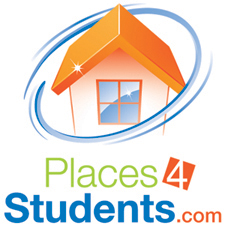
SpacesShared
Georgian has joined forces with SpacesShared to bring home sharing to Georgian communities, beginning with the Barrie area. The SpacesShared home sharing model is a fresh take on roommate living. With the help of technology, hosts and guests can connect easily to find affordable housing and rent out extra rooms in their homes. This partnership was built on the principle that the safety and security of all involved is paramount. SpacesShared performs background checks on hosts and guests before anyone moves into a home.
SpacesShared has built an easy-to-use platform that provides a place for older adults and students interested in home sharing to meet. SpacesShared is a safe one-stop-shop for hosts and guests to view profiles, available rooms, have virtual meetings, create and sign a home sharing agreement and make rental payments. Dedicated support is available from the SpacesShared team every step of the way.
SpacesShared is an appealing housing alternative for students because it provides an affordable housing option, and the opportunity to live with a local host who can offer valuable insights into the community and potentially into a student’s career path. Additionally, SpacesShared helps to minimize social isolation, and increase a sense of social belonging and financial stability for both hosts and students.
Types of off-campus housing and potential rental costs
Below is an overview of the different rental types you may find during your off-campus housing search. Rental costs are generally the same in all of out Georgian Communities.
Room rental
Private room: A private room in a shared house or apartment. Students should ask landlords if rent includes utilities and which areas of the house they can access before renting. Landlords usually don’t permit room sharing for single room ads.
Shared room: A shared bedroom in a house or apartment that is shared with others. Students should ask landlords if rent includes utilities and which areas of the house they can access before renting.
- Average price for a private room: $500 to $1,000 per month, per room (Source: RentBoard.ca)
- Average price for a shared room: $400 to $600 per month, per person
Apartment rental
An apartment typically consists of a living room, bedroom and kitchen. A bachelor apartment may incorporate these areas into one single room. Legally, the bathroom must always be separate with a functional door.
*Basement apartments may be fully equipped units that include all amenities as those above the ground.
- Average price: $1,900 per month for a one-bedroom apartment (Source: RentBoard.ca)
House rental
Independent units with multiple bedrooms to accommodate roommates, typically with a minimum of one floor.
- Average price: $2,400 per month for a three-bedroom house rental (Source: RentBoard.ca)
Homestay
Are you an international student? Consider living with a Homestay family who will provide a private bedroom, food for three meals per day and internet access. It’s a great way for you to immerse yourself in Canadian culture and experience Canadian life in a family setting. This housing option offers many opportunities to practise your English and improve your language skills.
Finding off-campus student housing
Six steps to finding and securing off-campus housing
After you’ve familiarized yourself with the types of rentals, housing rules and regulations, rental scams, roommate considerations and other helpful information on this page, you’re ready to start your search. Follow the steps below to find and secure a new place to live.
Start your off-campus housing search early
Start your search for housing as soon as know you’ll be attending Georgian, or as soon as you decide you want to move out of your current accommodations. If you wait, there is a great chance that you’ll have less places to choose from.
Landlords typically find out what spaces they will have available two to three months prior to the end of their ongoing leases.
Check back frequently for new advertisements
Be sure to check back often as new new rental opportunities that suit your needs may be advertised.
Details
Contacting a landlord by email
Many landlords prefer to receive rental inquiries via email over phone. Additionally, if you’re an international student carrying out your housing search from your home country, it may be difficult to contact a potential landlord by phone due to long distance charges and time zone differences.
It is important to note that landlords will use your email inquiry as a method of pre-screening. This is your chance to make a good first impression as a next step in securing off-campus housing.
Below are some details you may wish to include:
- Address the landlord by name, if known
- Include the address of the rental property you’re inquiring about
- Provide some basic information about what makes you a good tenant
- e.g. you’re a quiet, clean and respectful individual etc.
- Ask to arrange for a phone call to further discuss the rental, or to arrange an in-person viewing
Contacting a landlord by phone
A phone call is another way you may contact a potential landlord, but it’s possible you may need to leave a voicemail if the landlord is unavailable at the time of your call.
Before making the call:
- Prepare a list of questions and review your schedule in case the landlord wants to arrange a viewing
- Review the types of questions a landlord can and cannot ask you
- Make sure you know the rental address and inform the landlord where you found their advertisement or how you learned about their rental
- Take a deep breath and be sure to speak calmly and clearly
If the landlord answers your call:
- Ask any questions you may have about the rental
- Take notes on the landlord’s answers and other information provided so you can reference this later
- Set a date and time to see the rental in person as a next step
If you need to leave a voicemail:
- Keep your message short and focus on the important details
- Mention the address of the rental property you’re interested in
- Request the landlord call you back when they’re able to
- Leave your name and a phone number you can be reached at
View the rental in person
After previewing the rental property online or contacting a landlord, your next step will be to view the rental property in person.
Take precautions
Never arrange to meet a stranger at a property by yourself. Bring a trusted friend or family member with you, and always tell another person the address of the property you’ll be viewing.
Be sure to follow public health guidelines. You might want to consider wearing a mask or face covering, avoid physical contact and wash your hands thoroughly before and after the viewing. Stay home and reschedule the viewing if you feel unwell.
Make use of the housing search checklist
Review our housing search checklist and bring this with you to the viewing to help you with assessing the rental unit.
Places4Students.com
There are many options to find housing off-campus. Georgian College has partnered with Places4Students, a company that specializes in providing off-campus housing solutions to postsecondary students. Places4Students provide listings of properties available to rent, as well as profiles of students looking for roommates. This service is free of cost to Georgian students. Visit Places4Students.com to start your search.
Off-campus housing options
Off-campus housing websites
- Realtor.ca
- Kijiji
- Facebook Marketplace
- Zumper
- Rent Board
- Melchior Property Management
- Property Management Barrie
- Point2 Homes
- Local online newspaper classifieds: Barrie Today; Collingwood Today; Midland Today; Orangeville Banner; Orillia Matters; Owen Sound Sun Times
Word of mouth
Many students find out about off-campus housing rentals by word of mouth.
Reach out to friends and senior students who may know of an off-campus rental opportunity.
Disclaimer:
Georgian College does not inspect any online rental listings to verify for accuracy, safety, etc. Please use discretion and due diligence when looking for off-campus accommodations.
Georgian does not assume responsibility or liability for housing arrangements made by students using resources found through Georgian. We strongly advise seeking independent legal counsel before entering into a lease agreement with a landlord.
Students should inquire about the legality and suitability of rental units to protect their interests. Please visit the website and consult the Residential Tenancies
Act to ensure your rights are safeguarded. A copy of the Residential Tenancies Act can be obtained by visiting the Ontario Government Web Site.
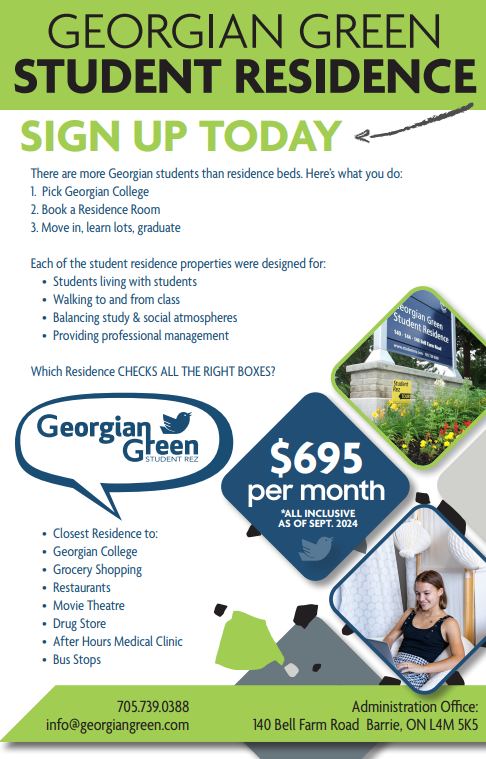
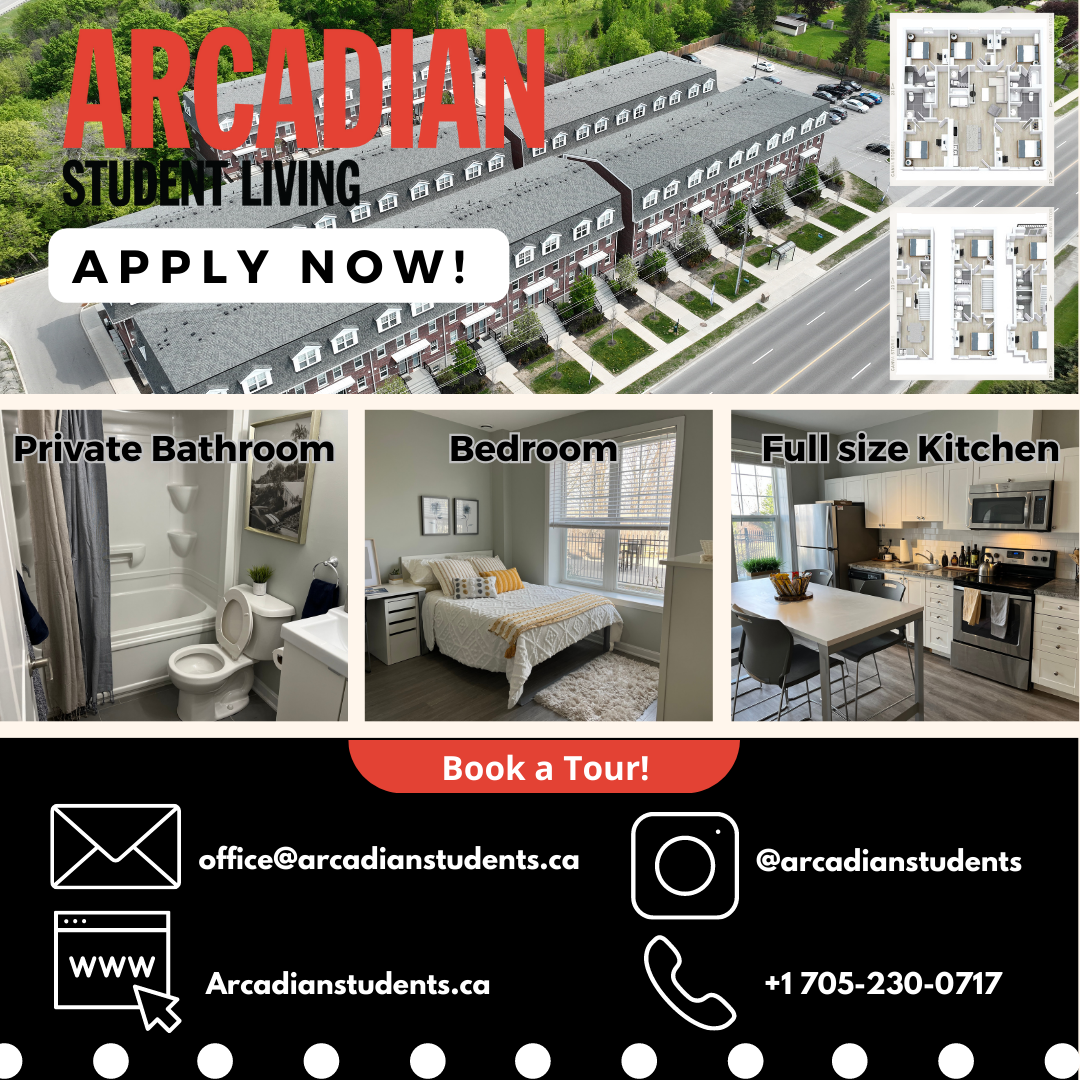
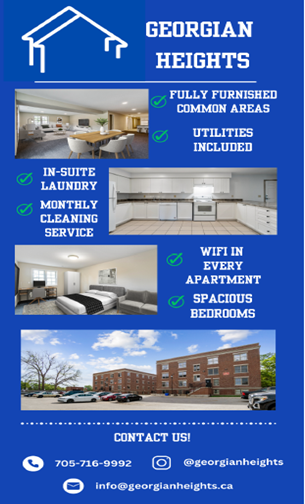

Before you sign a lease
Before entering into any lease agreement, here are some important actions to take:
- Avoid rental scams: Take precautions to avoid any possible rental scams. Make sure the information you have collected is legitimate before proceeding.
- Make sure the rental is legal and licensed: We strongly advise against renting an apartment that isn’t licensed by the city or town it is located in. Housing by-laws are put in place for a number of reasons, one of which is to make sure rental units meet building and fire code standards.
- Make sure the rental is right for you: Make sure you’re completely satisfied with the rental location, the landlord and the terms of the lease. After all, this will be your home for the next several months or a year (depending on the terms of your lease).
- Set and understand expectations: Be sure you and your future landlord communicate expectations before you enter into a lease agreement. This may include rules regarding smoking, pets, overnight guests, utilities, rent payments, repairs, maintenance and more.
Shared accommodations
If you’re going to share a house or apartment with roommate(s), here are some additional points to consider before signing:
- Understand how group leases work: A group lease means that each member is responsible to the landlord for full payment of the rent. It does not mean that each person is only responsible for their share. If one roommate leaves, the remaining household members must make up the deficit until a replacement roommate is found. This is something to keep in mind, and plan and budget for.
- Avoid overcrowding: There may be by-laws that restrict the number of tenants that can reside in a household. While you may consider living with multiple roommates to help decrease monthly rent costs, this may not comply with the by-laws in your area and may be cause for termination by a landlord.
Standard lease agreement
A verbal agreement is just as binding as a written contract. However, without the paperwork it is harder to prove in court when it is needed. All students are encouraged to engage in a standard lease agreement* with the landlord of their rental.
Lease agreement considerations
Keep in mind the following:
- Take it seriously: This is a legal contract and breaking it or not paying rent could influence your future. If you do not understand the details, do not sign.
- Get the details in writing: The lease must include the legal name and address of the landlord, and you’re entitled to receive a copy of the signed lease agreement within 21 days.
- Be aware of the lease term: Many landlords requests students sign a lease for 12 months. You may be able to sublet your rental for the co-op term if you need to relocate for work, for example
- Understand rules about deposits: The amount of a security deposit is limited to the rent for one rental period, up to a maximum of one month. This means if you pay rent on a weekly basis, the security deposit required may only equal one week’s rent. If you pay rent on a monthly basis, the security deposit may only equal one month’s rent and no more. This is covered by the Residential Tenancies Act and is the law. A deposit against possible damages is not legal.
- Sign once: Once your lease term is finished, you do not need to renew your lease each year. If you decide to stay, you’ll continue to pay rent on a month-to-month basis. If you plan to leave the rental unit, you must provide written 60-day notice to your landlord stating your intentions to terminate the tenancy.
*The standard lease is required for most private residential tenancies for new agreements signed on or after April 30, 2018. When complete, the standard lease creates a contract between the landlord and tenant. It is also called a residential tenancy agreement. The standard lease does not apply to care homes, sites in mobile home parks and land lease communities, most social and supportive housing, certain other special tenancies and co-operative housing.
Rental scams
Be aware and avoid off-campus housing scams
There are many unfortunate cases where students may become the victim of a housing scam.
Before you begin your housing search, learn more about commons types of rental scams and what you should keep in mind to avoid scams.
If you suspect that you have been the target of rental fraud, immediately report it to the Canadian Anti-Fraud Centre, the Royal Canadian Mounted Police (RCMP) or your local police station.
Common types of rental scams
Here are some common types of scams that you may come across:
- The landlord asks you to send the money as deposit to secure the unit without showing you the pictures of the property or without sharing further information to answer your questions
- The landlord is overseas and renting their unit from afar
- They cannot show the unit in person (or arrange for someone to show it for them) and request money be sent in exchange for mailed keys to a rental property that does not actually exist
- The property is already rented but is advertised online as available
- The scammer collects the application fee and deposits with no available rental
What to look out for
Here are some items to keep in mind when searching for housing:
- Rentals that seem too good to be true
- Landlords who ask you to send money overseas
- Rental advertisements that don’t show pictures of the property
- Multiple advertisements that have the same photos
- Invalid or incomplete contact information
- Be cautious with advertisements with only an email address, as scammers often do not have valid phone numbers
- Inability to speak to the landlord
- Always make an effort to speak to the landlord and current tenants, if possible, to ask questions before you sign the contract or make any payments
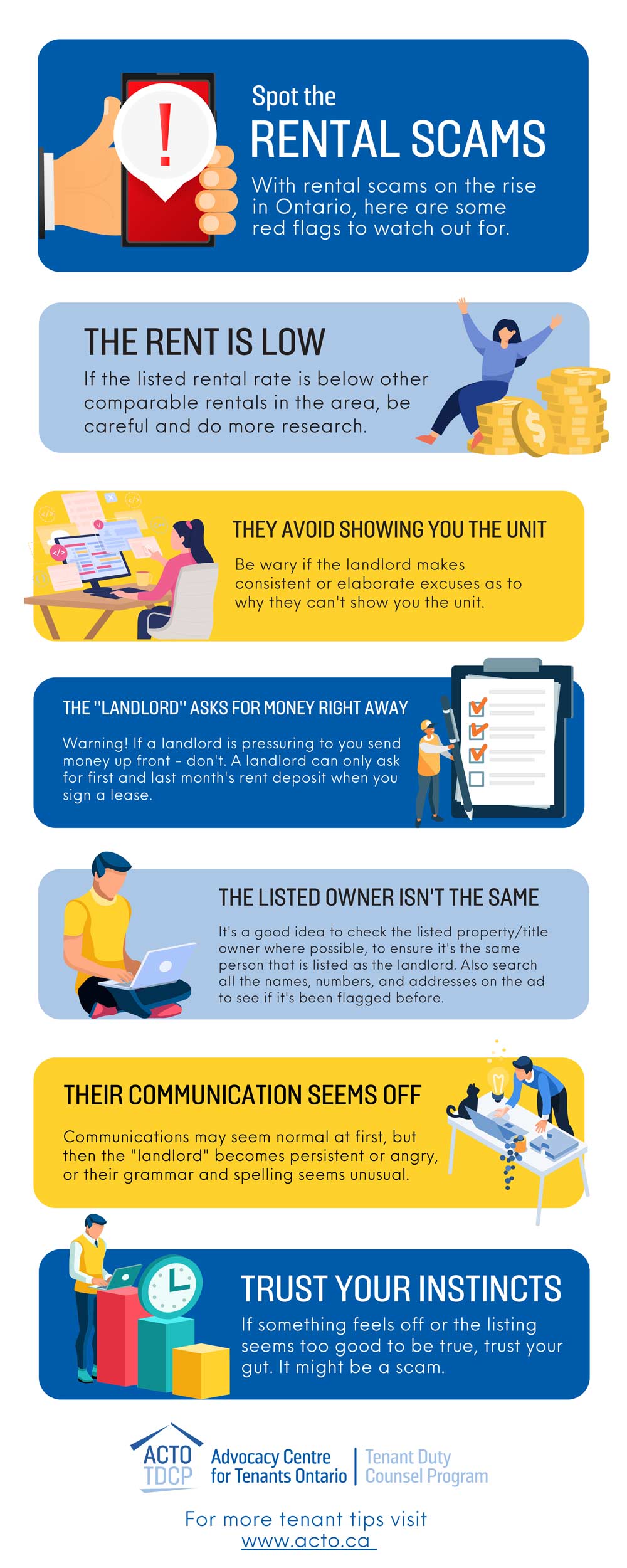
Living with roommates
Roommate considerations
College roommates can become friends for life, with a little common courtesy and respect. They can bring fun, laughter and great memories.
Some of the points you should consider when living with roommate(s) include:
- Respect each other and build a good friendship.
- Decide how each of you will contribute to household chores, e.g. who does the dishes, who takes out the garbage, etc.
- Respect each other’s privacy and do not touch personal belongings that belong to another roommate.
- Inform your roommate(s) if there will be guests coming to see you, staying over, etc.
- Communicate often to avoid confusion, conflicts and issues.

Before you move in
Get to know each other! Here’s how you can get help get things started off on a positive note:
- Introduce yourself and share your interests with your future roommates.
- Connect with each other on social media to communicate and learn more about each other.
After you move in
Soon after you move in, sit down with your roommate(s) and have a conversation about how you can live well together.
Download a copy of the roommate agreement form or create a list of potential issues, discuss them with your roommate(s) and come to an agreement on how to handle them. Once you have all come to an agreement, make sure everyone signs the document and does their part.
Location and transportation considerations
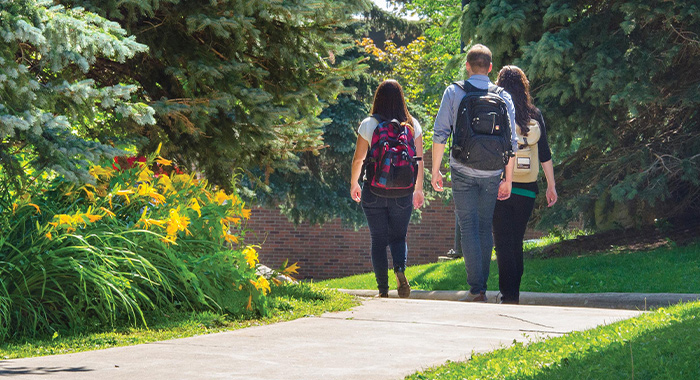
Distance from campus
When considering off-campus housing, it’s important to think about how far your future living space will be from the Georgian campus you’re studying at.
Ask yourself the following:
- Am I able to walk, bike or drive to campus each day?
- Will I need to use public transportation?
- How long will it take me to get to campus?
- Is there a safe route I can take to get to campus and back?
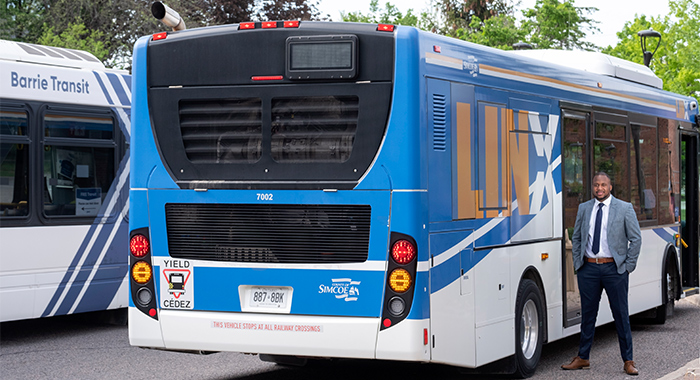
Public transportation
If you’re unable to walk, ride your bike or drive to campus, you may need to rely on public transportation.
Consider the following:
- Is public transportation available in my area?
- Where is the closest bus stop to my future rental?
- Is service offered during the times my classes take place?
- What will public transportation cost and does this fit my budget?
Insurance coverage
Content insurance
- If you rent an apartment, it’s important to secure adequate content insurance to protect your belongings.
- While your landlord may have insurance, this only protects the building; your personal belongings are not covered under their policy.
- Property or content insurance policies cover movable objects inside your home, or belongings and possessions that are not part of the fabric of your home. This insurance will cover your personal items like furniture, clothing, electronics, and more.
- This insurance is cost-effective and can be purchased through insurance brokers and banks.
Liability insurance
- Liability insurance covers your legal liability for negligence that results in bodily harm to someone else, or damage to someone else’s property.
- It also covers situations like accidental cooking fires, burst pipes and more.
- Without adequate liability insurance, you might be expected to pay the entire cost of re-building a burned premise or repairing the plumbing.
- Your landlord’s liability coverage does not protect you. Some rentals may require you to obtain your own liability coverage.
- Your lease may also specify the specific dollar amount of liability coverage required. You may be required to provide your landlord with proof of insurance.
Please note: Georgian College has no affiliations with or recommendations towards any insurance company.
Housing laws and regulations
Know the laws that affect tenants and landlords in Ontario
Moving away for college is exciting! Before you sign a lease or move into your new accommodations, take the time to learn about housing rules and regulations in Ontario – especially if you’re moving here from a different province or country where regulations may differ.
Additionally, invest some time in understanding your responsibilities as a tenant when it comes to maintaining your unit, being a good neighbour, and abiding by property standards by-laws.
Residential Tenancies Act
The Residential Tenancies Act (RTA) sets out the rights and responsibilities of landlords and tenants who rent residential properties in Ontario.
It covers tenancy agreements, rent, maintenance and repairs, ending a tenancy and more.
Landlord and Tenant Board
The Landlord and Tenant Board (LTB) helps resolve disputes between Ontario landlords and tenants.
The board provides information to landlords and tenants about their rights and responsibilities under the RTA.

Health, safety and security
It’s important that you’re familiar with items that play a role in housing safety, security and your health. Having safe housing is a significant factor to your success as a student!
In addition to the items below, don’t forget to ensure your unit is legal and licensed by the city or town. Housing by-laws are in place to make sure rental units meet building and fire code standards and are suitable for you to live safely and securely.
Bed bugs
Bed bugs are small biting insects that multiply quickly and travel easily. They’re not a health hazard and not known to spread any human disease, but they can cause skin reactions and may be a source of stress and anxiety if you experience them.
Contact your landlord immediately if you find bed bugs in your rental unit. The sooner you deal with them, the sooner you can get rid of them.
Resources
Fire safety
It’s important to make sure your potential off-campus student housing will make the grade when it comes to fire safety. Make sure your rental unit includes working smoke alarms and carbon monoxide detectors, a fire extinguisher and a fire escape plan.
For more information about these items and other fire safety precautions, review the resources below.
Resources
Home security
You’ll want to ensure your off-campus rental is safe and secure. Consider the following: Are the external doors solid? Do all external doors and windows have working locks? Is the unit well-lit in the dark? Are there security cameras surrounding the premises?
These items will help ensure the safety of yourself, your roommate(s) and your belongings.
Resources
Contact us
All Georgian campuses, and international student housing
249.388.1854
Email Housing
